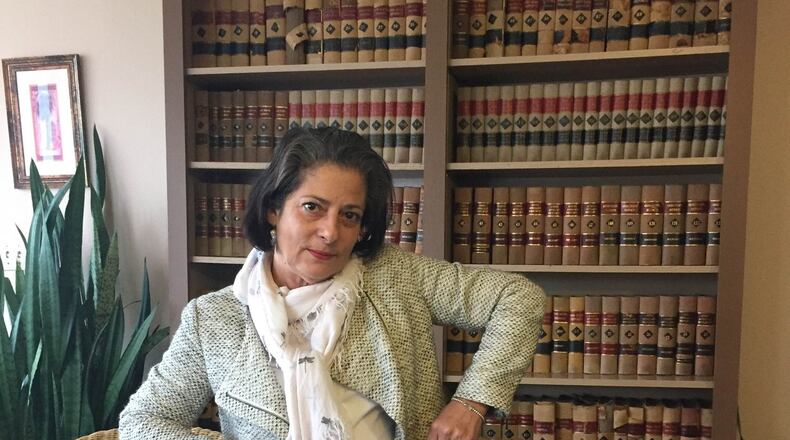It’s easy to overlook the smaller moments.
But Bob Chabali will never forget the moment when the family was prepared to take one of the famed “Freedom Flights” from Havana to Miami in 1962. “We were all at the airport, ready to go – my two uncles and aunt, their spouses, my cousins,” recalled Chabali, former Dayton assistant police chief. “They called my dad’s name on the intercom and the authorities told him he couldn’t leave; he was implicated in a plot against Castro. I started to cry and my mom started to cry.”
The terrified family decided to stay together, not knowing what the future would hold, Chabali said: “They rule by threat; there are no human rights. The government or police do not need a search warrant to enter your house and the threat of violence is always there.”
If they left without his father, who knew if they would ever see him again? “We are very family-oriented, which is a big Latin-American trait,” Chabali said. “My parents decided to stay together as a family and fight through.”
They were delayed another two years. There was no returning to the old house, the old life, the old careers. Chabali’s mother, Margot, a university professor, chose to leave her job rather than to teach socialist Communist doctrine. His father, Raoul, owned a men’s clothing store, “The Rooster,” that was taken over by the Communists. “There was no such thing as free enterprise,” Chabali said. “Everything was for ‘the people.’”
After two years “and an exchange of funds,” his father was cleared of the false charges and the family lived as refugees in a one-room boarding house in Madrid before obtaining documents and a sponsor to come to the United States.
Chabali wishes his parents had lived to see this day: “They would have been ecstatic that a true tyrant, a dishonorable man, a human rights violator, has passed away.”
Dayton attorney Isabel Suarez shared the moment with her parents, Enrique and Marta. Her father called at 4 a.m. with the news of Castro’s death. Before long her parents and brother and some Cuban friends gathered at her Old North Dayton law offices and sipping champagne. “While we can never celebrate the death of another human being,” she said, “he represented, for my parents’ generation, everything that they suffered.”
Suarez saw Castro only once, when he spoke for 11 hours at a marathon rally in her home province, Camaguey, in eastern Cuba. “He was so captivating,” she said. “He could capture the soul of anyone who listened to him. He was an eloquent, good-looking man, and people wanted to believe. But he destroyed the country.”
Suarez was 11 when she left Cuba in 1968, but she has no desire to return. “Never say never,” she said, “but it was too traumatizing. Why go?”
Her father, after all, endured two years in a labor camp for the crime of being Catholic. “He got caught celebrating Mass in someone’s home,” Suarez said.
And Suarez witnessed her own share of horrors. In 1962, she and her brother stumbled across a harvest of despair — bodies hanging from the trees outside the bank. Suicides. “People hanged themselves outside the bank after learning that Castro had seized all their assets,” she recalled. She was 6 years old.
Chabali longs to return to Cuba with his family. “All the time I ask myself, ‘Is it time?’ I don’t think it will be any time soon. It’s not the Cuba I left. The streets are broken, and old Havana is destroyed. Even the food doesn’t taste like it used to.”
But Chabali never abandoned his Cuban heritage; he raised his daughters to be bilingual. When he was growing up in Dayton his mother defied everyone who told her to stop speaking Spanish in the home. “I don’t want them to lose their culture,” she declared. “They can assimilate both cultures.”
“I’m very blessed to have come to America and to be exposed to freedom and democracy,” he said. “I have a great life and a great family.”
Both Chabali and Suarez cherish their right to vote. They’re baffled by the fact that nearly half the eligible voters in the United States didn’t turn out on election day. “I grew up in a country where dissent was met by prison or the firing squad,” Chabali said. “I have voted in every single local and election in my lifetime. We need to protect the freedom and democracy we have in this country and not take it for granted.”
Added Suarez, “Do you know how much people in Cuba would love to vote and choose their futures?”
And both are thankful to their parents for giving them a new life in the United States. “I value my parents’ ethics, morality and integrity,” Chabali said. “They could have stayed, and not uprooted themselves from their homeland, it wasn’t their homeland any more. My brother and I are blessed to have parents who took us out of Communism and brought us to democracy, because a lot of Cubans didn’t make it.”
These proud Cuban-Americans have refused to allow Fidel Castro to dominate their lives or determine their destiny.
It’s the image of another man that has profoundly influenced Bob Chabali. It’s the memory of a very small moment.
“I’ll never forget my dad stepping off the plane in New York City,” Chabali said, “and waving the American flag.”
About the Author

